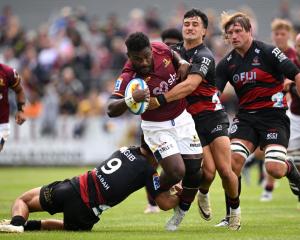New Zealand Rugby has moved to stem the tide of teenage males leaving the sport and to stop coaches from being able to force defaults.
The union launched a Game On initiative late last week, a series of measures to keep the game relevant in these changing times.
The many changes include rolling substitutions, golden oldies scrums and agreement over match length.
NZR head of participation and development Steve Lancaster said there were defaults by teams across the country and they numbered in the hundreds last year. Those defaults did not suit anyone as no-one was happy sitting in the clubrooms afterwards not having played the game.
‘‘What we have found is the number of senior players is not changing, it is holding. But there are less teams. So it is taking more people to form a team. And we know people still want to play but can not commit to a whole season,’’ he said.
Props were hard to find and some teams were running a couple of props out to start the game and then switching straight to golden oldies scrums, rather than default a game which was not helping anyone.
Under the Game On initiative, games could start with uncontested or contested scrums. Games could also start with contested scrums and then go uncontested if there were no substitutes on the bench who could go into the front row.
If one team came along with 18 players and another team had 13, then the game would not become a default as teams could look to match player numbers. If teams could not agree on the number of players on the field then the side with fewer players would decide on the size of teams.
The team with more players would then get the option to have rolling substitutions.
That would give them more options for bringing players on and give every player a game.
There was the option of swapping players from one team to the other to make even teams.
Lancaster said the biggest thing was to get players out and playing and make sure every game still counted in terms of the competition. It was unfair if one team benefited from a default.
Players still wanted to play in a meaningful competition.
Nationally, player numbers increased to more than 160,000 last season. The number of teenage male players had been falling for years but last season there had been an increase of 400 across the country which was a good result for NZR. That was an increase of about 1%.
Lancaster said it was great to stem the tide. He put it down to a good focus on getting proper competitions for every player, the growth in sevens and alternative grades such as rip-rugby, and playing games on days other than Saturdays.
He said rugby would be mostly still played on Saturdays and competitive grades would remain. But games could be shifted to midweek to reflect changes in society.
Comments
Although a football (soccer) supporter, of course I still do watch & am interested in rugby - although put off by the spectators rugby attracts.
My background interest is in sports marketing. These are suggestions I made years ago - to howling from the hinterlands - & I am pleased to see I have been vindicated.
If rugby wants to appeal to the long term then the next step will be necessary - - - umm too scared to say it.
In rural areas the culture where every spectator has to have a bottle of beer in their hand while doing the macho rugby swagger, coupled with the bad language as loud as possible, moreso in front of female company & young kids (which stops as soon as they drive out the gate of course) and seeing the teens in the 2nd XV breathless & useless on the field after they puff their mandatory ciggys to look cool.
The next generation actually don't see you guys as role models, but rather take up other sports.
BTW the above described loud louts love to stand in front of the elderly and block their view at these rural grounds.
So yes changes needed & these ones necessary if rugby is to survive.












